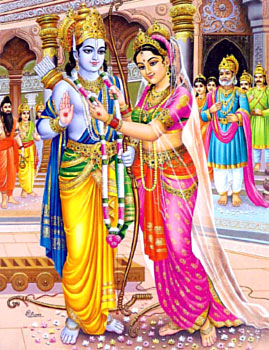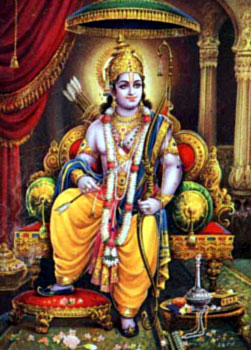 Marriage of Lord Rama with Sita, the daughter of Janaka of Mithila forms a major part of the Bala Kanda. After completing the duty of protecting the sacrificial rites of the great sage Vishwamitra, Rama asked the sage regarding their next course of action. Vishvamitra replied that Janaka, Raja of Mithila, was about to celebrate a great sacrifice. There was a great bow in Mithila which the gods gave long ago to Raja Devarata; and neither gods nor gandharvas nor asuras nor rakshasas nor men have might to string it, though many princes and kings have essayed it. That bow is worshipped as a deity. The King of Mithila had declared that the one who would string the bow would win Sita, his daughter, as his wife.
Marriage of Lord Rama with Sita, the daughter of Janaka of Mithila forms a major part of the Bala Kanda. After completing the duty of protecting the sacrificial rites of the great sage Vishwamitra, Rama asked the sage regarding their next course of action. Vishvamitra replied that Janaka, Raja of Mithila, was about to celebrate a great sacrifice. There was a great bow in Mithila which the gods gave long ago to Raja Devarata; and neither gods nor gandharvas nor asuras nor rakshasas nor men have might to string it, though many princes and kings have essayed it. That bow is worshipped as a deity. The King of Mithila had declared that the one who would string the bow would win Sita, his daughter, as his wife.
Thus all the Brahmans of that hermitage, with Vishvamitra as their head and accompanied by Rama and Lakshman, set out for Mithila; and the birds and beasts dwelling in Siddhashrama followed after Vishvamitra, whose asceticism was his wealth. As they went along the forest paths Vishvamitra related ancient stories to the two brothers, and mainly the story of the birth of Ganga, the great River Ganges. Janaka welcomed the ascetics with much honour, and requesting them to take their appropriate seats as per their rank; he asked who those brothers might be that walked amongst men like lions or elephants, godlike and goodly to be seen. Vishvamitra told King Janaka all the history of the sons of Dasharatha, their journey to Siddhashrama and fight with the rakshasas, and how Rama had now come to Mithila to see the famous bow.
The very next day, Janaka called upon the brothers to see the bow. First he told them how that bow had been given by Lord Shiva to the gods, and by the gods to his own ancestor, Devarata and added that he had a daughter by the name of Sita, not born of, but sprung from the furrow as he ploughed the field and hallowed it. He had kept a vow that the one who would be able to bend the bow would ultimately win his daughter. Many kings and princes tried their luck and failed to bend it. Then he told that if Rama could bend the bow then he will get Sita as his wife.
 Then the great bow was carried upon an eight-wheeled cart which was drawn by five thousand tall men. Rama drew the bow from its case and strove to bend it; it yielded easily, and he strung and drew it till at last it snapped in two with the sound of an earthquake or a thunder-clap. The thousands of spectators were terrified and amazed, and all but Vishvamitra, Janaka, Rama, and Lakshman fell to the ground. Then Janaka praised Rama and gave orders for the marriage to be prepared, and sent messengers to the kingdom of Ayodhya in order to invite Raja Dasharatha to wedding of his sons, to give his consent and blessing. Thereafter the two kings met and Janaka bestowed Sita upon Rama, and his second daughter Urmila on Lakshmana. To Bharata and Satrughna Janaka gave Mandavya and Srutakirti, daughters of Kushadhwaja, the younger brother of Janaka. Then those four princes, holding their respective bride`s hand, circumambulated the sacrificial fire, the marriage dais, the king, and all the hermits thrice, while flowers rained down from heaven and celestial music sounded. Then Dasharatha and his sons and their four brides returned home, taking with them many presents, and were welcomed by Kaushalya and Sumitra and the slender-waisted Kaikeyi. Having thus won honour, wealth, and noble brides, those four best of men dwelt at Ayodhya, serving their father.
Then the great bow was carried upon an eight-wheeled cart which was drawn by five thousand tall men. Rama drew the bow from its case and strove to bend it; it yielded easily, and he strung and drew it till at last it snapped in two with the sound of an earthquake or a thunder-clap. The thousands of spectators were terrified and amazed, and all but Vishvamitra, Janaka, Rama, and Lakshman fell to the ground. Then Janaka praised Rama and gave orders for the marriage to be prepared, and sent messengers to the kingdom of Ayodhya in order to invite Raja Dasharatha to wedding of his sons, to give his consent and blessing. Thereafter the two kings met and Janaka bestowed Sita upon Rama, and his second daughter Urmila on Lakshmana. To Bharata and Satrughna Janaka gave Mandavya and Srutakirti, daughters of Kushadhwaja, the younger brother of Janaka. Then those four princes, holding their respective bride`s hand, circumambulated the sacrificial fire, the marriage dais, the king, and all the hermits thrice, while flowers rained down from heaven and celestial music sounded. Then Dasharatha and his sons and their four brides returned home, taking with them many presents, and were welcomed by Kaushalya and Sumitra and the slender-waisted Kaikeyi. Having thus won honour, wealth, and noble brides, those four best of men dwelt at Ayodhya, serving their father.
Now, of those four sons, Rama was dearest to his father and to all men of Ayodhya. In every virtue he excelled; for he was of serene temper under all circumstances of fortune or misfortune, never vainly angered; he remembered even a single kindness, but forgot a hundred injuries; he was learned in the Vedas and in all arts and sciences of peace and war, such as hospitality, and policy, and logic, and poetry, and training horses and elephants, and archery; he honoured those of ripe age; he regarded not his own advantage; he despised none, but was solicitous for the welfare of every one; ministering to his father and his mothers, and devoted to his brothers, especially to Lakshman while Bharata and Satrughna lived with their uncle Ashwapati in another city. This ends the episode of Bala Kanda and begins the Ayodhya Kanda.












